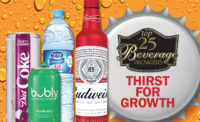Anheuser-Busch InBev expands reach of environmental commitment with new 5-year global goals
Company aims to decrease packaging by 100,000 tons, the equivalent of about a quarter of a billion full cans of beer *

Anheuser-Busch InBev (www.ab-inbev.com) commits to seven new global goals that address the company’s key environmental priorities. The goals focus on addressing the challenges faced by key areas for beverage facilities and barley growing regions. In addition, AB InBev will continue to improve operational efficiency by setting goals for further water and energy use reductions and, for the first time, setting global goals on packaging materials reduction and eco-friendly cooler purchases.
The goals are announced on AB InBev’s fifth annual global celebration of World Environment Day (WED), an initiative of the United Nations Environment Programme (UNEP).
“AB InBev’s new environmental goals focus on where it matters most – continuing to drive operational excellence, working intensely in key regions, and making the most efficient use of our shared resources,” says Carlos Brito, CEO of Anheuser-Busch InBev. “Our approach recognizes that there isn’t a one-size-fits-all solution to improve sustainability. The key will be to leverage the experience and expertise of our colleagues globally, foster a collective approach through partnerships with local stakeholders, and continue to scale best practices across our company.”
AB InBev aims to reach the goals, which are shared across 24 countries, by the end of 2017. The New Global Environmental Goals are set against a 2012 baseline:
- Reduce water risks and improve water management in 100% of our key barley growing regions in partnership with local stakeholders
- Engage in watershed protection measures at 100% of our facilities located in key areas in Argentina, Bolivia, Brazil, China, Mexico, Peru and the United States, in partnership with local stakeholders
- Reduce global water usage to a leading-edge 3.2 hectoliters of water per hectoliter of production, which is equivalent to about 5,400 Olympic-sized swimming pools1
- Reduce global greenhouse gas emissions per hectoliter of production by 10%, including a 15% reduction per hectoliter in China
- Reduce global energy usage per hectoliter of production by 10%, which is equivalent to the amount of electricity needed to light about a quarter of a million night football matches2
- Reduce packaging materials by 100,000 tons, which is equivalent to the weight of about a quarter of a billion full cans of beer
- Reach a 70% global average of eco-friendly cooler purchases annually3
The new commitments build on the three-year global environmental achievements reached at the end of 2012 from a 2009 baseline. The initial targets were achieved through a multi-faceted approach that applied a mix of operational changes, technological solutions, building effective partnerships and a sustainability-focused mindset, underscored by strong teamwork.
AB InBev also celebrates World Environment Day today and throughout the year through a series of local initiatives, including:
- Global Learning Exchanges, in which several AB InBev breweries will convene forums that bring together colleagues and representatives from local stakeholder groups, including business partners, government agencies and NGOs, to discuss and share best practices for water conservation and employee engagement
- Its fifth annual facility competition, titled “360° Sustainability Solutions: Water Challenge,” which encourages colleagues to submit projects that tackle water sustainability from a 360˚approach. Focus areas include initiatives inside the breweries, the supply chain, engaging partners and stakeholders, innovation, and personal contributions to environmental efficiency at home. The panel of judges includes a representative from UNEP and will select the competition’s global grand prize winner
- Employees will work together to clean up watersheds and rivers and to plant trees in regions where the company has breweries and soft drink facilities
- Employees are also encouraged to make a commitment to be environmentally responsible in their personal lives by recycling, carpooling or biking to work and saving water by shortening their showers, skipping shaving and turning off the water while brushing their teeth
1Based on the assumption that an Olympic-sized swimming pool has a volume of 25,000 hectoliters
2Based on the assumption that it takes 6.98 MWh to light a night football match
3LED lighting, eco-friendly refrigerant, and/or energy consumption control
*Based on the assumption that one full can of beer weighs 388 grams.
Looking for a reprint of this article?
From high-res PDFs to custom plaques, order your copy today!






